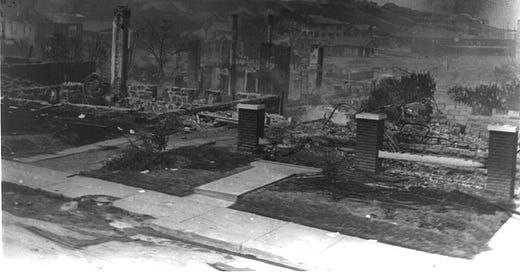Senator: I Am Worried that America Hasn’t Learned Lessons from the 1921 Tulsa Massacre
Coons criticizes efforts to ban teaching ugly chapters in US history
As the city of Tulsa, Oklahoma, and the nation stops to observe the occasion of the centennial of the worst race massacre in the US history, a senior US senator said that he's not certain the nation's learned its lessons from that dark time.
The Tulsa Race Massacre took place over May 31 and June 1, 1921, in which mobs of angry white residents — many of them deputized and handed weapons by the local government — rampaged through the Greenwood neighborhood of Tulsa, then known for its thriving Black community called “Black Wall Street.”
The massacre began after rumors that a 19-year-old Black shoeshine, Dick Rowland, had attacked the white 17-year-old elevator operator of a local building, Sarah Page.
In truth, it was likely that Rowland had merely stepped on Page's foot by accident.
However, racism set into motion murders of 300 Black Tulsans, leaving thousands homeless.
There were even reports those days of early aircraft passing over the Greenwood neighborhood and dropping primitive bombs on the residents’ homes.
Tulsa and Oklahoma have only in recent years begun coming to terms with the massacre. This week the Greenwood neighborhood observed the centennial since those horrific days.
President Biden issued a White House proclamation in observation of the solemn occasion, and dignitaries from around the country came to take part.
On the one hand, Sen Chris Coons (D-Del) said that he is optimistic about the investments in equality such as those made in the federal budget proposal Biden announced last week.
However, on the other, it seems too much of the country is trying to hide from the lessons from the massacre, Coons added.
“But frankly, as we see states in several places across the country, including right here in Oklahoma, adopting and enacting laws that limit the teaching of history, particularly the teaching of some of the more brutal and ugly chapters in American race history, I’m worried that we really haven’t learned the lessons of the Tulsa massacre of 1921,” he said.
There's been a spread, mostly by Republicans at the state level, to enact laws limiting the teaching of racist history in schools.
Asked by MSNBC host Jonathan Capehart what Americans have to fear from history, Coons said he wasn't sure.
“You know, Jonathan, it’s something that I have wrestled with myself in my own home state. Brown v. Board of Education, it’s one of the most iconic Supreme Court cases in American history, and yet it’s actually a combination of five cases. One of them based on a complaint by a parent of a school in my hometown of Hockessin, Delaware,” he said. “The school at issue was a quarter mile from my childhood home. Yet, this issue, this history wasn’t taught in the schools where I grew up or in my state. I’m joining with Congressman Clyburn and Congresswoman Lisa Blunt Rochester and others to add an important part about B. v. Board as a part of our national history.
"And I think the reason, frankly, that it’s not taught more deeply here in Tulsa and in Oklahoma, in my home state or elsewhere, is we are afraid open up the box of ugly chapters in American history," Coons added. "But we can only come to appreciate how far we have come if we know how deeply wrong and how badly broken these critical chapters in American history really were.”




